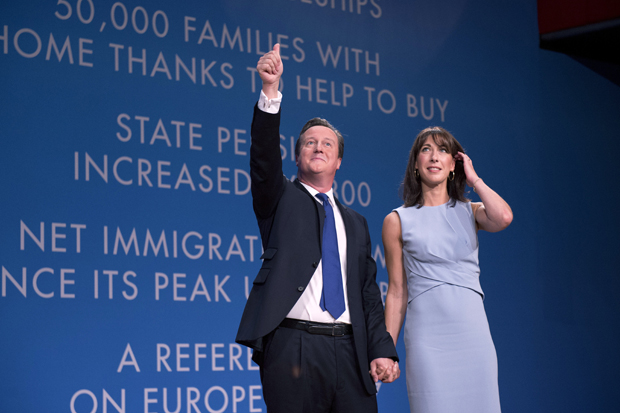Listen
Two things have been puzzling Tory high-ups in Birmingham this week: does Nigel Farage have another defector in his back pocket, and why is the Tory party in such a good mood? Many expected that a second MP defecting to Ukip would have plunged the party into the slough of despond.
One influential Tory, though, has an explanation for what’s going on. ‘The mood here is so upbeat because people think we’ve got Labour beat.’ He is, however, quick to add, ‘It is Ukip that is the problem.’
This is the paradox of British politics at the moment: it is easier to explain why either main party shouldn’t win the election than to advance an argument as to why they will. With just eight months to go, Labour trails on the economy and leadership by margins that would normally be considered terminal. But the Tories have a split on the right to contend with that makes it structurally nigh-on impossible for them to win.
Normally the last party conference season before an election has a clarifying effect, indicating which side has the ideas, energy and determination to win. Instead, the last fortnight muddied the waters still further — though Cameron’s decision to make a clearer distinction between himself and Labour on income tax has given the Tories far more definition than they had previously.
With Reckless’s defection and two by-elections coming up, the divide on the right is more apparent than ever. For the first time in the postwar era, there will be a serious split in the right-wing vote at a British general election. In 2010, Ukip scored a mere3 per cent. It is now polling consistently in the teens. Electing its first MP, as it is bound to do in Clacton, will give it ready access to the publicity it needs to keep up its momentum. Even the most optimistic Tory thinks they can only be squeezed down to about 8 per cent next year.
In a sign of how divided the right now is there are some senior Tories who almost seem to welcome these defections. One minister argues, ‘There was a split on the right which created Ukip. The problem is that some people got left behind in the wrong party. That they are now identifying themselves is not a wholly bad thing.’ But remove these voters from the Tory column and it is hard to see how the party can win outright.
Reckless’s defection, though, has not had the effect on the Conservative conference that one would have expected. Rather than traumatising the Tories, it has led to a reassertion of their tribal identity. On the fringe and in the bars there has been far less sympathy for Ukip than there was last year. The desire for a pact that was so frequently expressed the last time the Tories gathered together has been replaced by a desire to beat them. Cameron, who replaced a turncoat in his own seat of Witney, has cleverly played on the activists’ sense of betrayal to gee up the troops for the fight ahead.
The Tory Panglossians are busy claiming that Reckless has, unintentionally, done Cameron a favour. They argue that the momentum of a Carswell win in Clacton will be broken by a Reckless defeat in Rochester. One cabinet minister even contends that the Tories win even if it is Labour who take the seat, as it would prove the Tory argument that if you vote Ukip you get Miliband.
Labour, though, is not marching confidently towards victory. Its conference reinforced its weaknesses rather than addressing them. Ed Balls is in the difficult position of having acknowledged the need for the cuts to go on, but not having set out what he would cut. George Osborne’s decision to freeze working-age benefits was politically risky: five million working households will lose out from it. But it has succeeded in again raising the question of what Labour would do.
Balls is actually the most fiscally responsible member of the shadow cabinet. He has kept spending ministers on a tight leash. But preventing them from promising more cash for various things is far easier than setting out where Labour would actually take money from. Indeed, if Labour did set out anything like the cuts that are needed, it might well find some of its current support peeling off to the Greens. Support for the Greens, the only anti-austerity party in Britain, is now coming in as high as 6 per cent in some polls. If the Greens become a home for disaffected left-wing voters then Miliband will lose his electoral trump card: the united left. Equally, if Labour doesn’t address the deficit question then it will find it hard to reassure swing voters that it can be trusted with the economy.
The other issue on which Labour trails badly is leadership. In this anti-politics age, there is an aggressive cynicism about anyone who presents themselves as a possible prime minister. Cameron is, by dint of actually holding the office, insulated from this. Miliband, though, is subject to the full force of it. The Labour leader did not help himself by forgetting various key sections of his pitch in what he himself described as the start of his ‘job interview’ with the British people. Cameron, by contrast, saved the best till last. His pledge on tax gave the Tories the doorstep message that they did not havein 2010.
The question is, which party will get over the line next May? Senior cabinet ministers believe that the Tories could win — by which they mean ‘be the largest party in Parliament’, with a lower share of the vote than the 36 per cent they garnered last time.
In a four-party system, a hung parliament is the most likely result. So despite their dire national ratings, the Liberal Democrats could end up holding the balance of power again. What they decide in Glasgow next week could end up having as great an influence on British politics as anything the two main parties have said.
The electoral system that the Liberal Democrats have spent a generation raging against is now what offers them disproportionate influence.
Got something to add? Join the discussion and comment below.
Get 10 issues for just $10
Subscribe to The Spectator Australia today for the next 10 magazine issues, plus full online access, for just $10.
You might disagree with half of it, but you’ll enjoy reading all of it. Try your first month for free, then just $2 a week for the remainder of your first year.















Comments
Don't miss out
Join the conversation with other Spectator Australia readers. Subscribe to leave a comment.
SUBSCRIBEAlready a subscriber? Log in